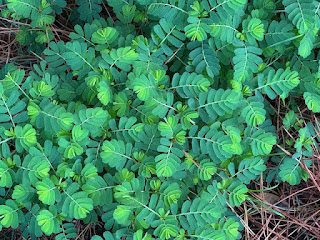Chamberbitter
Longstalked Phyllanthus
Doveweed Camellias + SeaHume and 17-00-09
Azalea
Horticulture Hotline 07/03/25
By Bill Lamson-Scribner
Happy 4th!
We are entering the ‘Dog Days of Summer.’ Heat, humidity, grassy weeds, broadleaf weeds, confused weeds, mosquitoes, mowing, trimming, pulling vines, pruning, dry areas, insects, diseases, heavy rain, no rain, well you get the idea…
Speaking of pruning, be sure to get your azaleas and camellias pruned as soon as you can. They will be making their flower buds that you see much later soon. Do you have azaleas and camellias on a good fertilization program as they have big appetites to perform their best?
Many of us have palm trees. I’m always talking / writing about preemergent products for lawns and beds to control weed seeds. Now is the time to preform palm seed control on your palm trees to prevent those hard to control palm seedlings from sprouting up everywhere you do not want them to sprout. Simply remove the stalks that will produce seeds from the palm now. Granted it is not an easy task, but it is easier than removing the volunteer palms later. Because it involves pole saws, or ladders, or lifts this job might be best off left for a professional.
What bothers me the most is you have battled through the weather (we are finally getting some rain) and paid huge water bills to have your yard looking nice, and once it starts to look good, fall army worms and then sod webworms attack the grass. Look for areas that appeared to have been mowed low and with a dull blade. You can see that the leaf blades have been chewed. Also thatch type debris will be churned up on the surface. Moths will fly low, during the day but mainly in the evening, dropping eggs across the lawn. Birds and low flying wasps are also predators of army worms. Thanks to cell phones, I took a cool picture of a wasp attacking the head of an army worm. I think my definition of ‘cool’ has changed over the years.
Since army worms are in direct contact with the ground, they are very easy to control. Bug Blaster, Bifen, Mosquito Pro (do not be confused by the name - this product does a great job of managing many insects) Cyonara and Acephate will all put a hurting on army worms. If you get them while the worms are small, Thuricide (Bt), EcoVia EC and Spinosad are organic products that will also work well. Since the population of worms is so high and hit so fast, keep your eye out for a second hatching. Prostrate growing weeds like spurge, lespedeza and Virginia Buttonweed seem to come in the fastest to the damaged areas.
If your yard has thatch, dry spots, or compaction issues, now is a great time to address these issues. At Possum’s we have a granular organic product (BGK 7500) that is full of microorganisms that are thatch eaters. Easy to apply with a fertilizer spreader after aeration or without aeration. Some of the zoysia grass lawns really benefit from regular use of this product. Wetting agents will help as well. We have liquid, organic, and granular wetting agents.
Always read, understand, and follow product label. The product label is a Federal Law.











